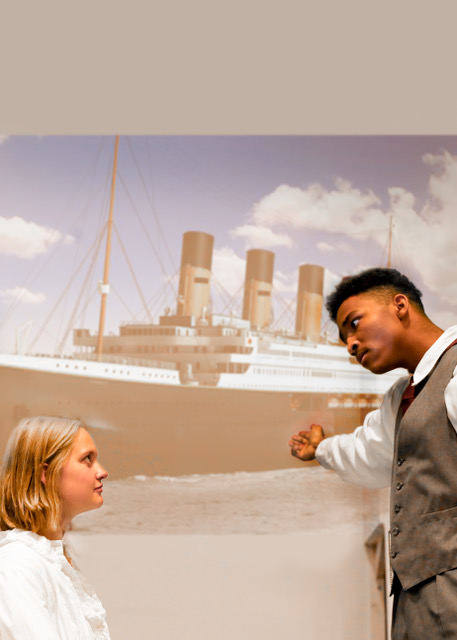
From Nov. 10-13, 2022, students from DePauw University conducted live performances of “Scotland Road” at the Moore Theatre in the Green Center for the Performing Arts. Transporting into a world of scientific investigation and mental puzzles, the theatrical play featured a captivating ensemble and visual set which explored the mysteries behind an intriguing character traumatized by a tragic voyage.
Originally written by playwright Jeffrey Hatcher, “Scotland Road” follows the fascinating enigma about Winifred, played by sophomore Jenna Reynolds and first-year Taylor Cripe, a young woman who claims to be a passenger from the RMS Titanic after being discovered on an iceberg. She undergoes an intensive interrogation by two researchers, John Astor, played by sophomore Griffin Chyall and first-year Joseph Alexander, and Halbrech, played by seniors Ashley Carrasquillo and Emilie Prince. Throughout the narrative, the scientists attempt to analyze Winifred’s refusal to speak about her past, uncovering secrets about her involvement in the Titanic. Yet Winifred’s identity was not the only mystery to be deciphered, but also the deceptive facades of each character who stepped foot into the interrogation room.
The play was skillfully portrayed by its diverse cast along with two different ensembles performed onstage on alternating days. Each actor’s subtle yet profound gestures highlighted the silent deceptions of the characters. For instance, Astor’s tight yet menacing demeanor reverberated through the stage, with every cruel look solidifying his character’s obsession with the Titanic. Meanwhile, the audience could easily get lost in the expressive eyes of Winifred, whose careful countenance hid ambiguous memories about a sunken ship. On the other hand, Halbrech’s seemingly approachable character was tainted by her fraudulent scientific qualifications, making Winfred repulsed by her actions later on. Lastly, Miss Kittle, an old woman believed to be a Titanic survivor played by senior Grace Merriman and first-year Rachel Schludecker,, presented a juxtaposing identity that punctured the powerful confidence of Astor but eventually fell victim to the accusatory statements of Winifred about the Titanic.
The compelling interactions between the four main characters left lingering questions within people’s minds. Yet this enigmatic atmosphere was highlighted by the unique seating arrangement of the audience, who were situated at the very edges of the Moore Theatre stage. Upon stepping foot into the ensemble’s world, viewers could breathe in every detail of the performance—the tipping of a wine glass, the subtle creaks of a chair, and the masterful microexpressions that added depth to each character. The exquisite attire of each actor was also evident, from Astor’s exquisite suit and tie to Winifred’s embroidered dress and skirt, showcasing the evolving personalities of these individuals.
Moreover, the incorporation of strategic visual elements strengthened the mysterious environment that enveloped the play. The plain white backdrop that surrounded the audience reflected the cold-hearted demeanor of the counterfeit researchers, along with the emptiness from the tragedy of the Titanic. Furthermore, the white CCTV cameras perched atop the walls and the monochrome furniture of the interrogation room emphasized the empty questions left unanswered, as Winifred’s involvement in the Titanic became painted in sadness and ambiguity. Yet the sudden illumination of the walls during the latter portion of the play sent shivers through the audience’s fingers, as the apparition of the Titanic emerged around Winifred and Astor. Eventually, viewers left the theater with their minds filled with curiosity, as the two main characters surrendered to a psychological voyage only they could understand.
“Scotland Road” is an enigmatic yet alluring performance that left each audience member with their own unique connection to the characters’ narratives. As it elicited conversations between friends who tried to decipher between fiction and reality, the psychological thriller undoubtedly made a striking impact on the DePauw community, leading to a continuously evolving fascination for theater and storytelling.


